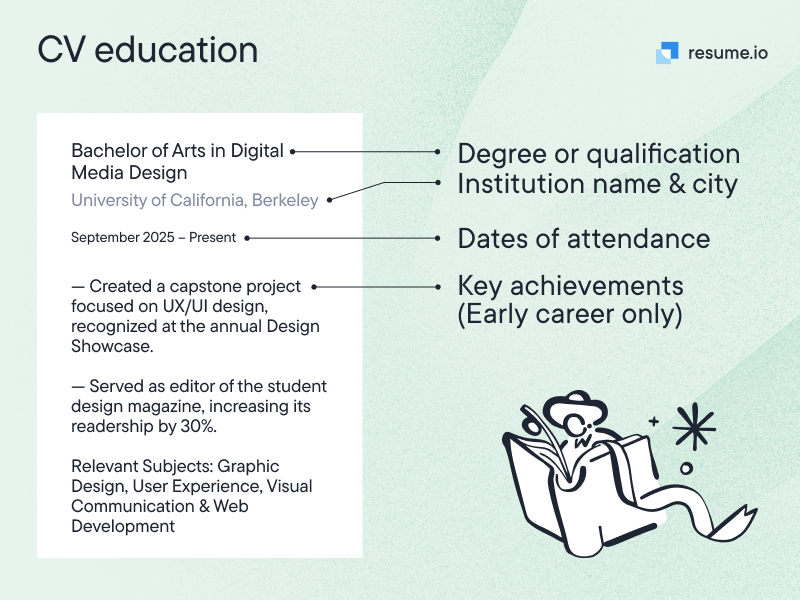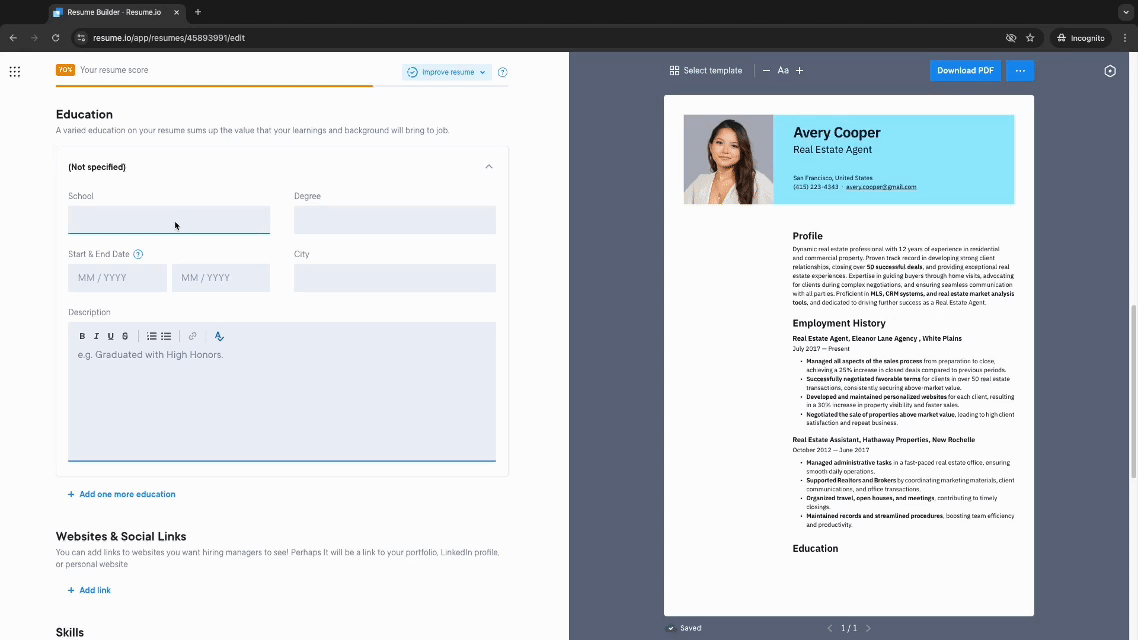Your CV is an opportunity to show off the best of your professional expertise and get you one step closer to that job you’ve always wanted. An important part of that expertise is your hard-earned qualifications. So knowing how to write your degree on your CV is vital.
You need to condense all that time you spent buried under books in university libraries into a formatted list. Sure, your CV’s other sections are important, too. But how can you make sure recruiters don’t overlook your hard work?
Standing out from the crowd
University students numbers reached record highs in 2020, 2021, and 2022. Standing out against a studious crowd of jobseekers is no easy feat, but it’s certainly not impossible.
This blog post will cover:
- Why it’s important to list your degree
- How to write your degree on your CV
- Where you should write your degree on your CV
- Mistakes to avoid when writing about your degree.
Why is it important to know how to write your degree on your CV?
Writing your degree on your CV is important for both you and your potential employer. You invested valuable time and effort when you undertook your degree or higher education qualifications. That deserves some space to shine on your CV!

Not to mention, your degree speaks to your ability to do a good job. The hiring manager wants that kind of information on your CV. A degree could be one of the boxes that the hiring manager needs to tick. Today many high-skilled jobs require higher education qualifications.
Appeasing the algorithm
Before your CV makes it in front of the hiring manager, it will likely need to pass the ATS (Applicant Tracking System). This is an algorithmic software that filters applications so only the best-suited make it in front of the hiring manager.
If the job you’re applying to requires a degree and the ATS doesn’t spot one in a recognisable format on your CV, your carefully crafted CV might be sent straight to the “no” pile.
Statistics also show that there’s still a significant wage premium for graduates. Completing higher education and writing your degree on your CV can increase the kind of salary you can expect. Don’t put yourself at a disadvantage for salary negotiations because you struggled to communicate your expertise by not knowing how to write your degree on your CV.
Stay on top of trends
Current job market trends show that high-skill jobs are increasingly in demand across the world. So, if you’re a graduate on the job hunt, your degree should absolutely have a spot to shine on your CV.
You won’t be able to beat out the competition without knowing how to write your degree on your CV. If your degree is not written on your CV, you could even come across as if you don’t have the necessary qualifications!
How you should write your degree on your CV

When writing your degree on your CV, split each qualification into separate subheadings and list them in reverse chronological order. You should write your most recently-earned degree — or one that is currently in progress — at the top and work your way back.
See how to write your degree on your CV in the example below:
BA (Hons) Fine Art (2:1). University of Lancaster, Lancaster
September 2013 - May 2016
If you are still studying, you can list your expected graduation date or simply write the most recent date as “Present”.
Where you should write your degree on your CV
You should write your degree in your CV’s education section. If that space is already relatively full from your secondary school qualifications, it’s time to prioritise the most recent qualifications. If you’ve completed a degree or equivalent qualification from a higher education institution, you can leave out your secondary school or college qualifications altogether.
When it comes to writing your degree on your CV, you can also consider mentioning relevant projects or work experience you carried out for your degree in your “Previous experience” section. This will allow you to capitalise on the space available in your CV. Think of it as adding extra detail as to why your degree equipped you with relevant skills and experience for your target job.
Make your degree on your CV stand out
If you have no work experience, then listing only the basic details of your degree won’t cut it. Don’t be shy about including relevant modules or your dissertation title, especially if they’re relevant to the role you’re applying to. The best way to do this is by adding bullet points underneath the subheading relating to your degree.
You can save on space by using the appropriate abbreviation for your degree. Here are some examples of how to concisely write your degree on your CV.
Undergraduate degrees:
- BA (Bachelor of Arts)
- BSc (Bachelor of Science)
- BEng (Bachelor of Engineering)
Postgraduate degrees:
- MEng (Master of Engineering)
- MSc (Master of Science)
- MA (Master of Arts)
- MEd (Master of Education)
- LLM (Master of Laws)
- MBA (Master of Business Administration)
- MRes (Master of Research)
Ultimately, you have limited space on your CV to explain why your degree is relevant and impressive for the job you’re applying for. Do your best to include a level of detail that elicits curiosity. Focus on the skills and knowledge you gained from your studies that could be applied to the particular job role that you’re applying for. Your end goal is always to pique enough interest to gain an invitation to interview.
How to format your education section on your CV
A general rule of thumb is that the best CV format is the one that most hiring managers are expecting to see. Usually this is the reverse chronological format. This classic format prioritises your employment history and includes your degree and other education further down the page.
However, if you’re a recently graduated job seeker, you might want to shift your CV focus to your education and skills sections. This can be particularly useful if your most recent work experience isn’t entirely relevant to the jobs that you’re applying for.
With that in mind, you could consider a functional CV layout, also known as a skills-based CV. This format focuses on your skills and education as opposed to employment history.
Mistakes to avoid when writing your degree on your CV
Lying about your qualifications
While it may be tempting to change the grade of your qualification, the truth about lying on your CV is that it’s not worth the risk. Losing your job and tarnishing your reputation are just some of the risks you run should your potential employer find out.
Not only could word get out, but you could struggle to land yourself a new position as a result. Resist the temptation to lie about finishing your degree, even if you consider it a point of embarrassment.
Spelling and grammar mistakes
No hiring manager looking to take on a professional with higher education qualifications will be impressed if they spot spelling or grammar mistakes. This is especially true when it comes to the section where you’ve listed your degree. Instead of putting your best foot forward, your CV will communicate the message that even though you’ve spent years studying, perhaps you’ve got some more learning to do.
Make sure you give yourself every opportunity for success by proofreading. If you want to be even more thorough, get a friend or family member to read through your CV for you, too.
Bad formatting of your degree and education section
To avoid bad formatting, make sure you spend time making sure that the visual quality of your CV matches the quality of your writing. Each section should have some visual breathing space to separate them from one another.
One big block of information would be an eyesore and more importantly, make it much harder for hiring managers to find what they’re looking for. Consider how you will visually distinguish the education section heading from your degree’s subheading and any bullet points you might want to include underneath.
Too much information
No matter how proud you are of your higher education, make sure that you’re only including the necessary level of detail when you write your degree on your CV. Including bullet points such as any accolades you were awarded during your degree or particularly relevant projects can be useful.
However, if the hiring manager has to scan through irrelevant details about your degree to understand why you’re the right candidate for this job, then it’s time to edit down your CV.
Key Takeaways
- Knowing how to write your degree on your CV is about knowing how to communicate to the hiring manager why you’re suited to the role at hand.
- Listing your degree on your CV not only opens up a world of job opportunities – your earning potential increases, too.
- Remember to take the time to choose the best CV format for your level of experience.
- Your education section - and occasionally your previous experience section - are the best spots to write about your degree on your CV.




